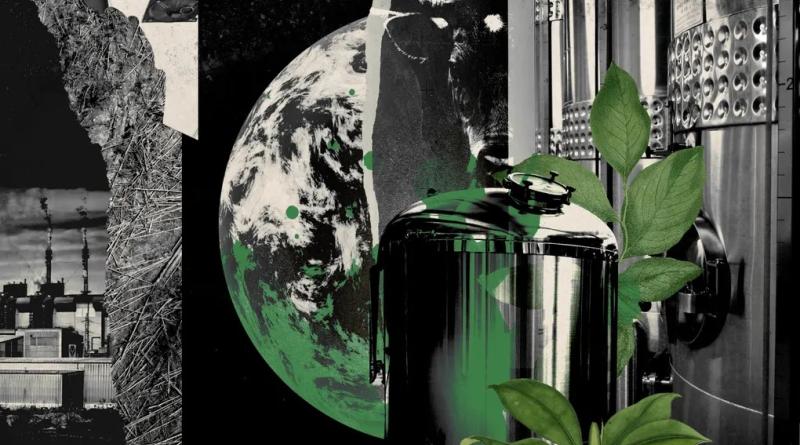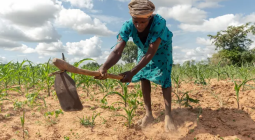Embrace what may be the most important green technology ever. It could save us all

Never mind the yuck factor: precision fermentation could produce new staple foods, and end our reliance on farming
So what do we do now? After 27 summits and no effective action, it seems that the real purpose was to keep us talking. If governments were serious about preventing climate breakdown, there would have been no Cops 2-27. The major issues would have been resolved at Cop1, as the ozone depletion crisis was at a single summit in Montreal.
Nothing can now be achieved without mass protest, whose aim, like that of protest movements before us, is to reach the critical mass that triggers a social tipping point. But, as every protester knows, this is only part of the challenge. We also need to translate our demands into action, which requires political, economic, cultural and technological change. All are necessary, none are sufficient. Only together can they amount to the change we need to see.
Let’s focus for a moment on technology. Specifically, what might be the most important environmental technology ever developed: precision fermentation.
Precision fermentation is a refined form of brewing, a means of multiplying microbes to create specific products. It has been used for many years to produce drugs and food additives. But now, in several labs and a few factories, scientists are developing what could be a new generation of staple foods.
The developments I find most interesting use no agricultural feedstocks. The microbes they breed feed on hydrogen or methanol – which can be made with renewable electricity – combined with water, carbon dioxide and a very small amount of fertiliser. They produce a flour that contains roughly 60% protein, a much higher concentration than any major crop can achieve (soy beans contain 37%, chick peas, 20%). When they are bred to produce specific proteins and fats, they can create much better replacements than plant products for meat, fish, milk and eggs. And they have the potential to do two astonishing things.
The first is to shrink to a remarkable degree the footprint of food production. One paper estimates that precision fermentation using methanol needs 1,700 times less land than the most efficient agricultural means of producing protein: soy grown in the US. This suggests it might use, respectively, 138,000 and 157,000 times less land than the least efficient means: beef and lamb production. Depending on the electricity source and recycling rates, it can also enable radical reductions in water use and greenhouse gas emissions. Because the process is contained, it avoids the spillover of waste and chemicals into the wider world caused by farming.
If livestock production is replaced by this technology, it creates what could be the last major opportunity to prevent Earth systems collapse, namely ecological restoration on a massive scale. By rewilding the vast tracts now occupied by livestock (by far the greatest of all human land uses) or by the crops used to feed them – as well as the seas being trawled or gill-netted to destruction – and restoring forests, wetlands, savannahs, natural grasslands, mangroves, reefs and sea floors, we could both stop the sixth great extinction and draw down much of the carbon we have released into the atmosphere.
The second astonishing possibility is breaking the extreme dependency of many nations on food shipped from distant places. Nations in the Middle East, north Africa, the Horn of Africa and Central America do not possess sufficient fertile land or water to grow enough food of their own. In other places, especially parts of sub-Saharan Africa, a combination of soil degradation, population growth and dietary change cancels out any gains in yield. But all the nations most vulnerable to food insecurity are rich in something else: sunlight. This is the feedstock required to sustain food production based on hydrogen and methanol.
Precision fermentation is at the top of its price curve, and has great potential for steep reductions. Farming multicellular organisms (plants and animals) is at the bottom of its price curve: it has pushed these creatures to their limits, and sometimes beyond. If production is distributed (which I believe is essential), every town could have an autonomous microbial brewery, making cheap protein-rich foods tailored to local markets. This technology could, in many nations, deliver food security more effectively than farming can.
There are four main objections. The first is “Yuck, bacteria!” Well, tough, you eat them with every meal. In fact, we deliberately introduce live ones into some of our foods, such as cheese and yoghurt. And take a look at the intensive animal factories that produce most of the meat and eggs we eat and the slaughterhouses that serve them, both of which the new technology could make redundant.
The second objection is that these flours could be used to make ultra-processed foods. Yes, like wheat flour, they could. But they can also be used to radically reduce the processing involved in making substitutes for animal products, especially if the microbes are gene-edited to produce specific proteins.
This brings us to the third objection. There are major problems with certain genetically modified crops such as Roundup Ready maize, whose main purpose was to enlarge the market for a proprietary herbicide, and the dominance of the company that produced it. But GM microbes have been used uncontroversially in precision fermentation since the 1970s to produce insulin, the rennet substitute chymosin and vitamins. There is a real and terrifying genetic contamination crisis in the food industry, but it arises from business as usual: the spread of antibiotic resistance genes from livestock slurry tanks, into the soil and thence into the food chain and the living world. GM microbes paradoxically offer our best hope of stopping genetic contamination.
The fourth objection has more weight: the potential for these new technologies to be captured by a few corporations. The risk is real and we should engage with it now, demanding a new food economy that’s radically different from the existing one, in which extreme consolidation has already taken place. But this is not an argument against the technology itself, any more than the dangerous concentration in the global grain trade (90% of it in the hands of four corporations) is an argument against trading grain, without which billions would starve.
The real sticking point, I believe, is neophobia. I know people who won’t own a microwave oven, as they believe it will damage their health (it doesn’t), but who do own a woodburning stove, which does. We defend the old and revile the new. Much of the time, it should be the other way around.
I’ve given my support to a new campaign, called Reboot Food, to make the case for the new technologies that could help pull us out of our disastrous spiral. We hope to ferment a revolution.
-
George Monbiot is a Guardian columnist
cover photo: Illustration: Eleanor Shakespeare/The Guardian





